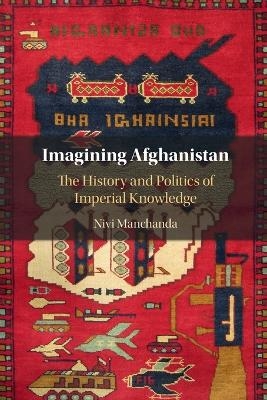
Imagining Afghanistan
The History and Politics of Imperial Knowledge
Seiten
2022
Cambridge University Press (Verlag)
978-1-108-81176-7 (ISBN)
Cambridge University Press (Verlag)
978-1-108-81176-7 (ISBN)
An innovative examination of knowledge production relating to Afghanistan in the imperial imagination. Focusing on representations of gender, state and tribes, Manchanda argues that the development of pervasive tropes in Western conceptions of Afghanistan have enabled both colonial and contemporary foreign intervention in the region.
Over time and across different genres, Afghanistan has been presented to the world as potential ally, dangerous enemy, gendered space, and mysterious locale. These powerful, if competing, visions seek to make sense of Afghanistan and to render it legible. In this innovative examination, Nivi Manchanda uncovers and critically explores Anglophone practices of knowledge cultivation and representational strategies, and argues that Afghanistan occupies a distinctive place in the imperial imagination: over-determined and under-theorised, owing largely to the particular history of imperial intervention in the region. Focusing on representations of gender, state and tribes, Manchanda re-historicises and de-mythologises the study of Afghanistan through a sustained critique of colonial forms of knowing and demonstrates how the development of pervasive tropes in Western conceptions of Afghanistan have enabled Western intervention, invasion and bombing in the region from the nineteenth century to the present.
Over time and across different genres, Afghanistan has been presented to the world as potential ally, dangerous enemy, gendered space, and mysterious locale. These powerful, if competing, visions seek to make sense of Afghanistan and to render it legible. In this innovative examination, Nivi Manchanda uncovers and critically explores Anglophone practices of knowledge cultivation and representational strategies, and argues that Afghanistan occupies a distinctive place in the imperial imagination: over-determined and under-theorised, owing largely to the particular history of imperial intervention in the region. Focusing on representations of gender, state and tribes, Manchanda re-historicises and de-mythologises the study of Afghanistan through a sustained critique of colonial forms of knowing and demonstrates how the development of pervasive tropes in Western conceptions of Afghanistan have enabled Western intervention, invasion and bombing in the region from the nineteenth century to the present.
Nivi Manchanda is a senior lecturer in International Politics at Queen Mary University of London. Her research interests include postcolonial theory, histories of race and empire, and gender studies. She is co-editor of Race and Racism in International Relations: Confronting the Global Colour Line (2014) and currently serves as editor in chief of the journal Politics.
Introduction; 1. The construction of Afghanistan as a discursive regime; 2. A space contested or the 'state' of Afghanistan; 3. The emergency episteme of the 'tribe' in Afghanistan; 4. Framed: portrayals of Afghan women in the popular imaginary; 5. Subversive identities: Afghan masculinities as societal threat; Coda.
| Erscheinungsdatum | 07.12.2022 |
|---|---|
| Zusatzinfo | Worked examples or Exercises; 11 Halftones, black and white |
| Verlagsort | Cambridge |
| Sprache | englisch |
| Gewicht | 387 g |
| Themenwelt | Geisteswissenschaften ► Geschichte ► Regional- / Ländergeschichte |
| Sozialwissenschaften ► Politik / Verwaltung ► Europäische / Internationale Politik | |
| ISBN-10 | 1-108-81176-0 / 1108811760 |
| ISBN-13 | 978-1-108-81176-7 / 9781108811767 |
| Zustand | Neuware |
| Haben Sie eine Frage zum Produkt? |
Mehr entdecken
aus dem Bereich
aus dem Bereich
Erinnerungen
Buch | Softcover (2024)
Pantheon (Verlag)
CHF 22,40
Universalgelehrter, Polarreisender, Entdecker
Buch | Hardcover (2024)
mareverlag
CHF 39,20


